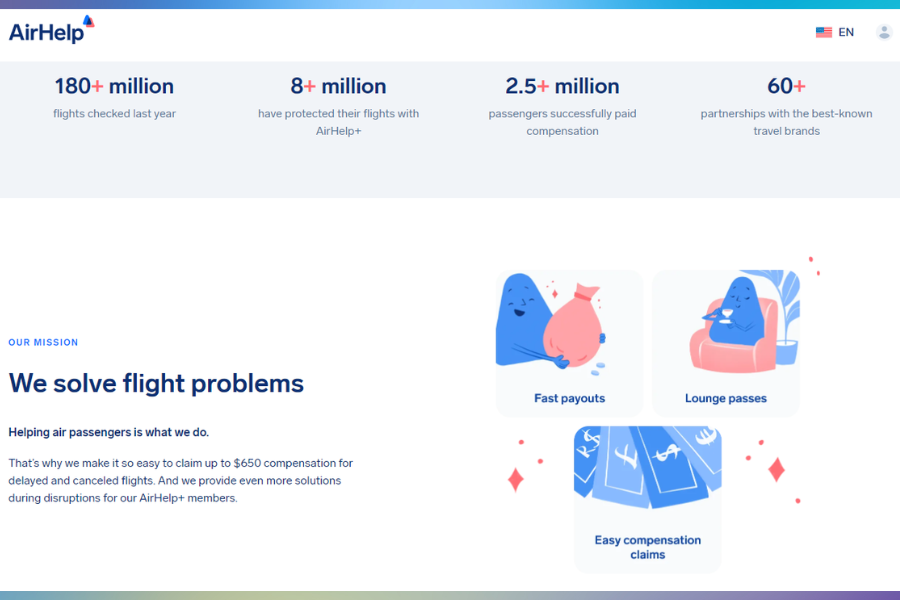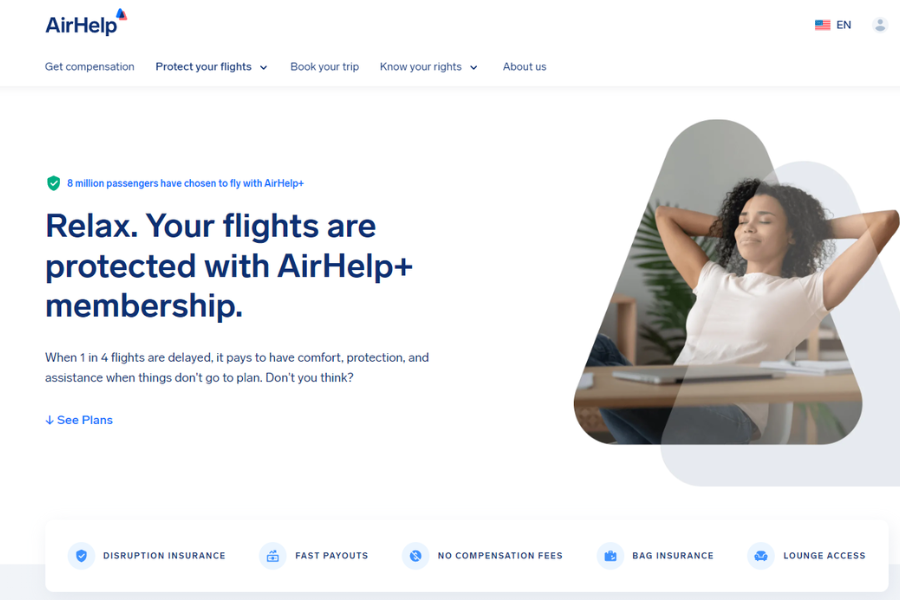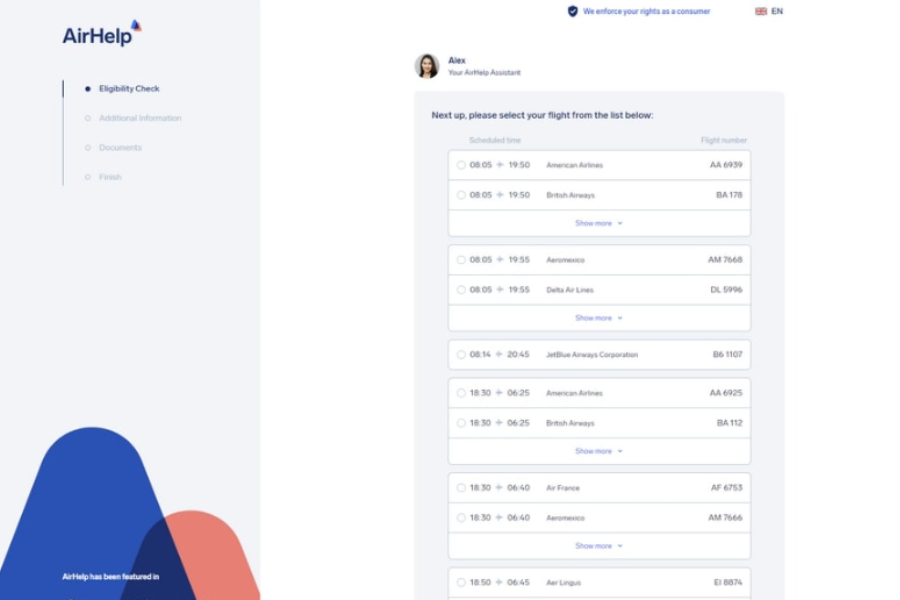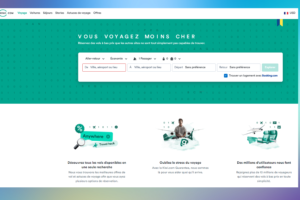Table of Contents
ToggleIntroducing airhelp delayed flight compensation platform
What is AirHelp?
AirHelp is a company that helps airline passengers claim compensation for flight disruptions such as cancellations, delays, or overbookings. It was founded in 2013 by Henrik Zillmer, Nicolas Michaelsen and Greg Roodt.
How AirHelp Works
- Initial assessment: AirHelp first determines if a passenger is eligible for compensation through a web form or mobile app. This initial assessment is free.
- Pursuing the claim: If AirHelp determines the passenger is entitled to compensation, they can commission the company to pursue the claim in exchange for a fee. The fee is only charged if AirHelp is successful in obtaining compensation.
- Settlement or legal action: AirHelp negotiates with the airline to settle the claim out-of-court. If the airline refuses, AirHelp can take legal action. Their lawsuits have led to courts clarifying legal questions regarding passenger rights.
- Compensation payout: If the claim is successful, AirHelp transfers the compensation amount to the passenger. Available payment methods include bank transfer, check, and PayPal.
Key Features
- Utilizes passenger rights regulations like EU261 in Europe, ANAC 400 in Brazil, and Montreal Convention in the US to help passengers get compensation
- Uses AI and multiple databases to verify flight disruption details and substantiate claims against airlines
- Offers a no-win, no-fee policy so passengers don’t risk any money pursuing claims
- Provides regular updates to passengers on the status of their claims
- Publishes annual global rankings of airlines and airports based on on-time performance, service quality, and other factors
Pricing and Fees
AirHelp charges a percentage-based fee that is only collected if they successfully obtain compensation for the passenger. The exact fee varies by country and claim amount.
Customer Reviews
AirHelp has over 170,000 reviews on Trustpilot with an average rating of 4.6 out of 5 stars, indicating a high level of customer satisfaction. Reviewers praise the company’s effectiveness in getting compensation and the ease of using their service compared to dealing with airlines directly.
What are the most common reasons for flight compensation claims?
Flight compensation claims arise when passengers experience disruptions such as delays, cancellations, or denied boarding. Here are the most common reasons for these claims:
Common Reasons for Flight Compensation Claims
- Flight Delays and Cancellations: The primary reason passengers seek compensation is due to significant delays (generally over three hours) or cancellations. Under EU Regulation 261/2004, passengers are entitled to compensation if the delay or cancellation was not due to “extraordinary circumstances” such as severe weather or security threats.
- Overbooking: Airlines often overbook flights, anticipating that some passengers will not show up. When all booked passengers arrive, those who cannot board are eligible for compensation under EU regulations.
- Technical Issues: Delays caused by technical problems with the aircraft are typically the airline’s responsibility. Passengers can claim compensation for delays resulting from these issues unless they can prove that the problem was an unforeseen manufacturing defect.
- Missed Connections: If a delayed flight causes a passenger to miss a connecting flight, they may claim compensation for the entire journey if it meets the criteria set out in EU regulations.
- Lack of Proper Communication: Airlines are required to inform passengers of their rights and any changes to flight status. Failure to do so can lead to valid claims for compensation.
Reasons Claims May Be Denied
While many claims are valid, airlines often deny them based on specific grounds:
- Extraordinary Circumstances: Airlines can reject claims if they prove that delays were caused by extraordinary circumstances beyond their control, such as extreme weather or air traffic control strikes.
- Claims Outside Time Limits: Passengers must file claims within a certain timeframe (typically within three years in the EU). Claims filed after this period may be rejected.
- Insufficient Documentation: Lack of proper documentation (like boarding passes, confirmation of delays, etc.) can lead to claim denial. Proper records are essential for substantiating claims.
- Flight Origin and Destination: If a flight is not departing from an EU airport or operated by an EU airline, passengers may not be eligible for EU compensation rules.
Understanding these common reasons can help passengers navigate the complexities of filing flight compensation claims effectively.
How AirHelp ensures they get the highest compensation for passengers
AirHelp employs a comprehensive strategy to ensure that passengers receive the highest possible compensation for flight disruptions, such as delays and cancellations. Here’s how they operate:
Automated and Expert Assessment
- Automated Tools: AirHelp utilizes advanced automated assessment tools to quickly evaluate claims. These tools analyze a variety of data, including flight reports, weather conditions, and applicable passenger rights laws, to determine eligibility for compensation. This process allows for rapid initial evaluations and helps identify the best jurisdiction for the claim based on the flight’s details.
- Human Expertise: For cases that are too complex for automated systems, AirHelp’s trained specialists step in. These experts have in-depth knowledge of air passenger rights and work alongside a vast network of lawyers specializing in this field across nearly 30 countries. This dual approach ensures that both straightforward and complicated cases are handled effectively.
Thorough Documentation and Negotiation
- Case Preparation: After assessing the claim, AirHelp gathers all necessary documentation and prepares a solid case to present to the airline. This includes collecting signatures and any required paperwork to support the claim.
- Negotiation with Airlines: AirHelp takes on the responsibility of negotiating with airlines on behalf of the passengers. They keep passengers informed throughout this process, which can take several weeks or months depending on the airline’s workload. If an airline agrees to compensate, AirHelp ensures that the payment is processed promptly.
Legal Action When Necessary
- Escalation to Legal Proceedings: If an airline rejects a claim or fails to respond, AirHelp does not abandon the case. Instead, they escalate it through legal channels using their network of specialized lawyers. This may involve sending legal warnings or even pursuing litigation if necessary. AirHelp covers all legal costs upfront, which can be significant, thereby reducing financial risk for passengers.
No Win, No Fee Policy
- Risk-Free Compensation Claims: AirHelp operates on a “no win, no fee” basis. This means that passengers only pay if their claim is successful, making the process financially accessible. The fees are deducted from the compensation awarded, which can reach up to €600 per passenger depending on the circumstances of the disruption.
Educational Resources
- Passenger Rights Awareness: A key part of AirHelp’s mission is to educate passengers about their rights under various regulations (like EC 261 in Europe). Many passengers are unaware of their eligibility for compensation; thus, AirHelp’s efforts in raising awareness can lead to more successful claims overall.
In summary, AirHelp combines technology with human expertise to navigate the complexities of air passenger rights effectively. Their structured approach—from automated assessments and expert intervention to negotiations and legal action—ensures that they maximize compensation for their clients while minimizing financial risk through their no-win-no-fee policy.
Are there any hidden fees associated with using AirHelp’s services?
AirHelp operates on a transparent pricing model, primarily charging fees only when they successfully secure compensation for a passenger. Here’s a detailed breakdown of the fees associated with their services:
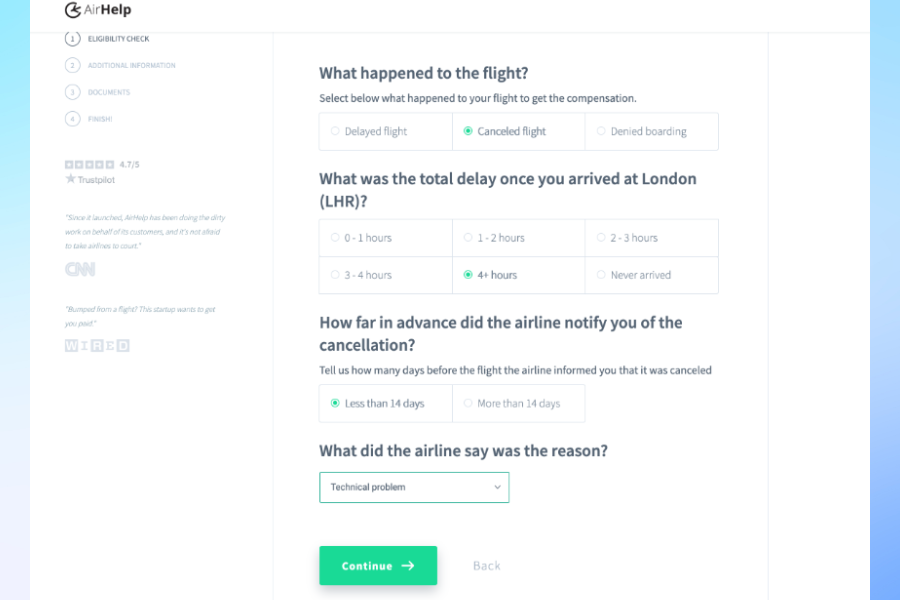
Are there any hidden fees associated with using AirHelp’s services
Fee Structure
- Service Fee: AirHelp charges a 35% service fee on the compensation amount secured from the airline. This fee is inclusive of VAT.
- Legal Action Fee: If legal action is necessary to obtain compensation, an additional 15% legal action fee is applied. This fee is also included in the total compensation amount.
- AirHelp Plus Membership: For those who subscribe to AirHelp Plus, these fees are waived. The membership costs vary:
- Essential Plan: Approximately €24.99 per year
- Complete Plan: Approximately €49.99 per year
Members can claim compensation without incurring any service or legal fees, making it a cost-effective option for frequent travelers.
No Hidden Fees
AirHelp emphasizes that there are no hidden fees associated with their services. They operate on a “no-win, no-fee” basis, meaning that if they do not successfully obtain compensation, you will not be charged anything. Additionally, there are no charges for their eligibility and information services unless compensation is successfully secured.
Goodwill Claims
In cases where AirHelp handles goodwill claims (which may involve smaller amounts), they charge a nominal fee of $29.99, but this fee is waived if the compensation is less than $30 or involves non-monetary compensation.In summary, while AirHelp does have specific fees that apply upon successful claims, they maintain transparency in their pricing and do not impose hidden costs on their customers.
How AirHelp handles complaints against uncooperative airlines
AirHelp specializes in helping passengers with complaints against airlines, especially when they are uncooperative. Here’s an overview of how AirHelp manages complaints in such situations:
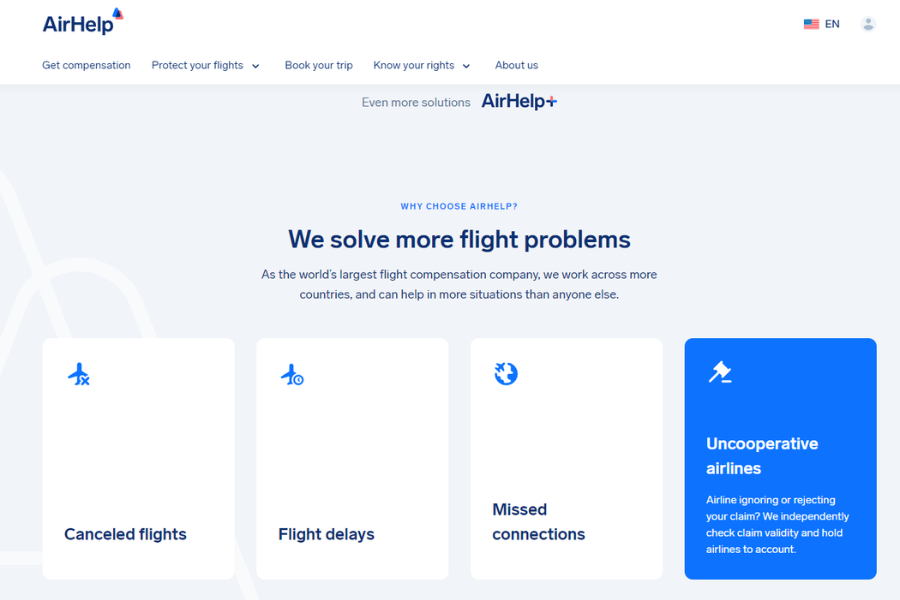
How AirHelp handles complaints against uncooperative airlines
1. Understanding Passenger Rights
AirHelp educates passengers about their rights under laws like EU Regulation 261/2004 (EU261), which mandates compensation for flight delays, cancellations, and denied boarding for flights in Europe. Many passengers are unaware of these rights, and airlines can be reluctant to inform them.
2. Complaint Submission
Passengers start by submitting their complaint to AirHelp via their website or mobile app. They provide flight details and reasons for their claim, such as a delay or cancellation. AirHelp assesses whether the claim qualifies for compensation under the relevant regulations, such as EU261 or similar global rules.
3. Airline Communication
Once the complaint is validated, AirHelp acts as a mediator between the passenger and the airline. They handle all communication and negotiation on behalf of the passenger, using their legal expertise to argue the case. Airlines can sometimes ignore or reject direct customer complaints, but they are more likely to respond when legal experts are involved.
4. Persistence and Legal Action
If the airline refuses to cooperate or reject the claim, AirHelp escalates the case. In uncooperative situations, AirHelp can pursue legal action against the airline. They work with a network of legal professionals across countries to ensure that airlines comply with compensation regulations.
5. No Win, No Fee Model
AirHelp operates on a “no win, no fee” basis. This means passengers don’t need to pay upfront for the service, and AirHelp only charges a fee if the claim is successful. This model encourages uncooperative airlines to settle claims quickly to avoid legal proceedings and extra costs.
6. Automation and AI
AirHelp uses AI technology to automate the claim assessment process, ensuring that claims are processed efficiently, even in large volumes. This technology helps streamline complaints, especially when airlines use delaying tactics.
7. Customer Support and Updates
Throughout the process, AirHelp provides regular updates to passengers. This ensures that passengers are kept informed about the progress of their claim, relieving them of the frustration of dealing with uncooperative airlines directly.
8. Final Compensation
Once a settlement is reached, AirHelp ensures that the compensation is paid to the passenger. They deduct their service fee from the payout, and the rest is transferred to the passenger.
AirHelp’s methodical approach, combining legal expertise, technology, and persistent communication, helps them successfully handle complaints against airlines that may be uncooperative. They take the burden off the passenger and increase the chances of obtaining rightful compensation.
What are the main regulations that AirHelp operates under?
AirHelp, an international company that assists air passengers with compensation claims for flight disruptions, operates under various regulations, primarily concerning air passenger rights. The main regulations that AirHelp operates under include:
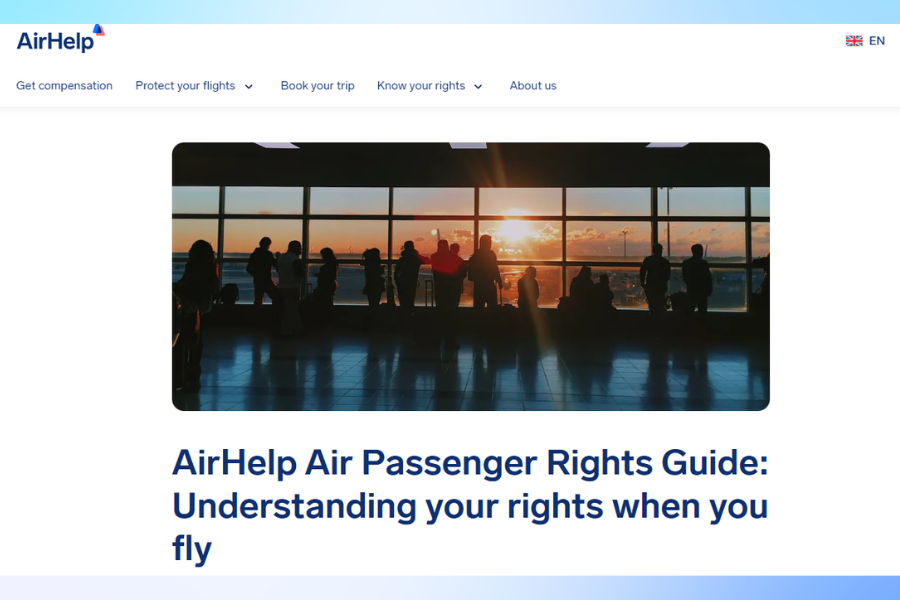
What are the main regulations that AirHelp operates under
1. EU Regulation 261/2004 (EC 261)
This European law is one of the most significant frameworks for passenger compensation. It covers flights departing from EU countries or operated by EU airlines, even if the flight originates outside the EU. Under this regulation, passengers are entitled to compensation for delays, cancellations, or denied boarding if the airline is at fault. The compensation amounts range from €250 to €600, depending on the flight distance and the length of the delay.
2. Montreal Convention
The Montreal Convention is an international treaty that governs airline liability for various issues, such as flight delays, baggage delays, and lost or damaged luggage. It applies to international flights and sets guidelines for compensation when airlines are responsible for passenger or baggage issues. AirHelp uses the Montreal Convention when handling compensation claims for long-distance international flights.
3. US Department of Transportation (DOT) Regulations
AirHelp assists passengers flying to or from the United States under the regulations set by the U.S. Department of Transportation. These rules provide protections against denied boarding, long tarmac delays, and the handling of lost or damaged baggage. However, unlike EU regulations, U.S. rules do not typically offer compensation for flight delays and cancellations unless the airline is directly responsible.
4. Other National Regulations
AirHelp also operates under specific national regulations in countries that have their own air passenger rights laws, such as:
- Brazil’s ANAC Resolution 400, which governs flight compensation for delays and cancellations within Brazil.
- Canada’s Air Passenger Protection Regulations (APPR), which provide compensation for delays, cancellations, and other air travel disruptions within Canada.
5. Airline Contracts of Carriage
Airlines’ terms and conditions, often referred to as the “Contract of Carriage,” also play a role in how compensation is handled. AirHelp reviews these contracts to determine how individual airlines are bound by their own policies, which may offer additional compensation to passengers.
AirHelp navigates these regulations on behalf of passengers, ensuring they receive the maximum compensation for disruptions caused by airlines.
What makes AirHelp different from other flight compensation companies
AirHelp stands out from other flight compensation companies in several ways that make it a preferred choice for passengers seeking compensation for flight disruptions. Here are the key aspects that differentiate AirHelp:
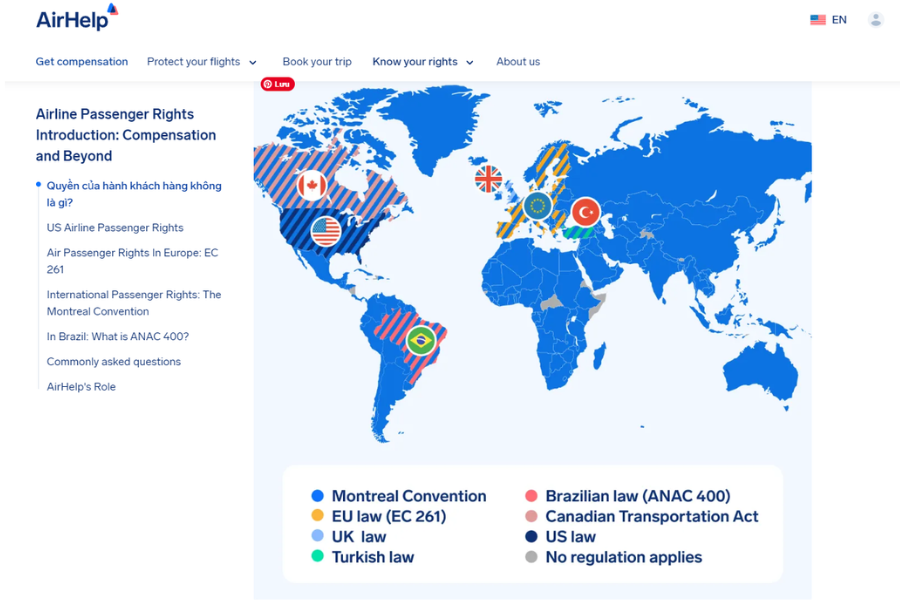
What makes AirHelp different from other flight compensation companies
1. Global Reach and Expertise
AirHelp operates on a global scale, helping passengers with flight compensation claims across many countries and jurisdictions. Their expertise in international air passenger rights and their large legal network ensure that they can assist with compensation claims under both European Union Regulation (EC 261/2004) and various international agreements, making them more versatile than companies that focus only on one region or set of regulations.
2. Advanced Technology and AI Tools
AirHelp uses advanced AI-driven technology to analyze flight data and predict the likelihood of success for compensation claims. This use of technology allows them to streamline the claims process, handle large volumes of cases more efficiently, and provide faster responses to their clients. The automation of parts of the process also helps reduce errors and speeds up claim submissions compared to more traditional flight compensation companies.
3. Comprehensive Claim Handling
While some flight compensation companies focus exclusively on EC 261 claims for delays and cancellations, AirHelp offers a broader range of services. They handle claims for baggage issues, cancellations, and denied boarding, making them a more comprehensive service provider for passengers experiencing various types of travel disruptions.
4. Easy-to-Use Platform
AirHelp’s user-friendly platform and mobile app make it easier for customers to file claims online. Customers simply need to input their flight details, and AirHelp does the rest, including liaising with the airlines and handling legal proceedings if necessary. This ease of use, paired with excellent customer service, sets them apart from companies that require more manual or complex claim filing processes.
5. No Win, No Fee Model
AirHelp operates on a “No Win, No Fee” basis, meaning that customers only pay if their claim is successful. This risk-free model reassures passengers that they won’t incur unnecessary expenses, unlike some companies that charge upfront fees for legal services.
6. Transparency and Customer Support
AirHelp provides full transparency on fees and case progress, ensuring that customers are kept informed at every step of the process. Their excellent customer service and support, available in multiple languages, make them accessible to a diverse audience.
7. Legal Support and Court Representation
Unlike smaller or newer companies, AirHelp offers full legal support, including court representation if necessary. Their team of experienced legal professionals ensures that even complex cases are handled smoothly, with the possibility of taking airlines to court when needed. Many other companies do not provide this level of legal backing.
8. Educational Resources and Awareness Campaigns
AirHelp is also known for its efforts to educate passengers about their rights. They run awareness campaigns and offer resources that inform travelers about compensation eligibility, further distinguishing them from competitors that solely focus on claim handling.
In summary, AirHelp’s global reach, AI technology, comprehensive services, easy-to-use platform, transparent pricing, and strong legal backing make them a standout choice in the flight compensation industry. These qualities help streamline the often-complicated compensation process and make it accessible to passengers worldwide.
What are the main benefits of using AirHelp compared to filing a claim individually?
Using AirHelp for filing flight compensation claims offers several advantages compared to handling the claim process individually. Here are the key benefits:
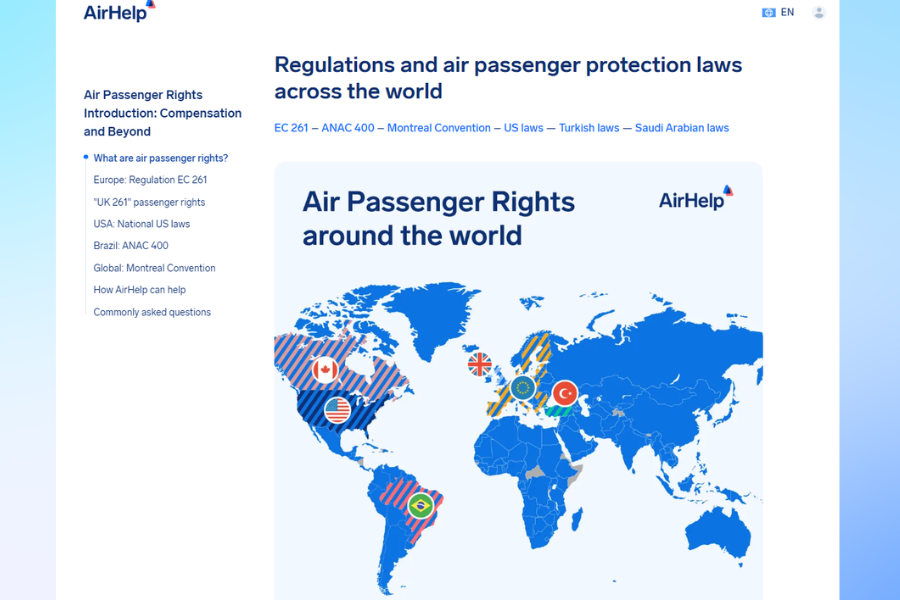
What are the main benefits of using AirHelp compared to filing a claim individually
1. Expertise and Experience
AirHelp specializes in airline compensation claims and has years of experience dealing with complex legal situations across various jurisdictions. This ensures a higher chance of success, as they understand the legal intricacies, deadlines, and documentation required for claims under EU261 and other regulations.
2. No Upfront Costs
AirHelp operates on a no-win, no-fee basis. This means that customers do not have to pay anything unless AirHelp successfully wins the claim. Filing individually might incur legal fees and court costs if the case becomes more complicated.
3. Time-Saving
Filing a claim individually can be time-consuming, requiring multiple interactions with the airline and understanding legal paperwork. AirHelp handles everything on behalf of the customer, including communication with airlines and, if necessary, taking the case to court, allowing customers to avoid the hassle.
4. Higher Success Rate
Airlines are often uncooperative or may reject valid claims from individuals, assuming they lack the knowledge or resources to fight back. AirHelp, with its experience and resources, can effectively push back against rejections and escalate cases, including taking legal action when necessary. Their involvement often increases the likelihood of receiving compensation.
5. Global Reach
AirHelp can process claims from flights across the world, regardless of where the traveler is based. Their global presence and knowledge of international air travel laws ensure that claims are handled according to the correct jurisdiction, which would be more challenging for an individual traveler to manage.
6. Legal Support
If the airline refuses to pay out compensation or disputes a claim, AirHelp provides legal representation without additional costs. Doing this individually would involve hiring a lawyer, which could become expensive and complicated, especially when dealing with cross-border legal issues.
7. Convenient and User-Friendly
AirHelp provides a streamlined, easy-to-use platform where customers can submit their claim within minutes by simply entering flight details. This convenience is in contrast to filing individually, where one might need to gather substantial information and deal with slow airline response times.
8. Handling Rejections
If an airline rejects a claim or offers inadequate compensation, AirHelp knows how to appeal and negotiate effectively. Many travelers may not know their full rights or give up too soon after a rejection when pursuing the claim alone.
9. Updates and Tracking
AirHelp keeps clients updated throughout the claim process and provides a tracking feature to monitor the progress of the claim. Filing individually could mean dealing with long waiting periods and lack of communication from the airline.
In summary, AirHelp offers expertise, convenience, and a higher likelihood of success without upfront costs, making it a more attractive option compared to filing claims individually.
What types of flight interruptions does AirHelp cover
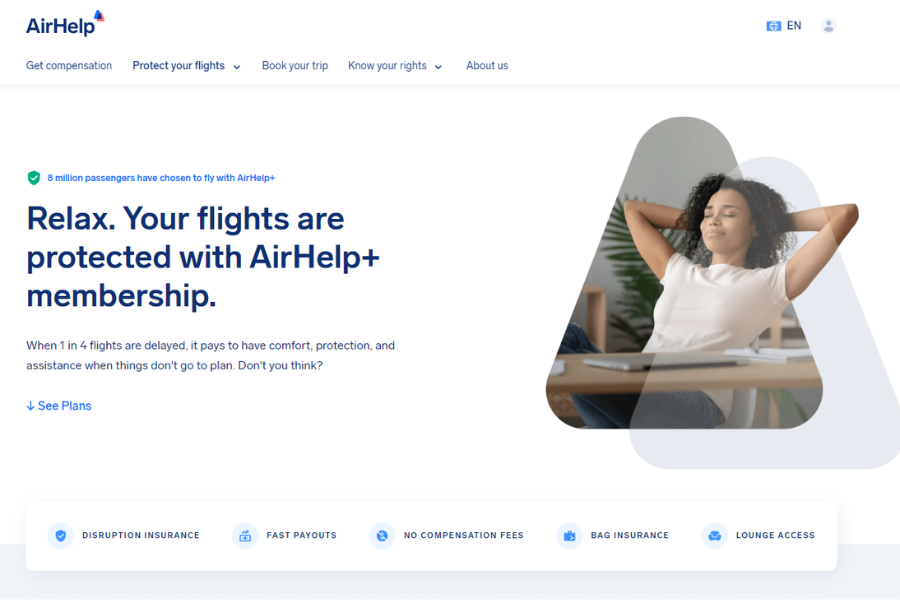
What types of flight interruptions does AirHelp cover
AirHelp covers a range of flight disruptions that impact passengers, primarily under EU Regulation EC 261, but also under other regional and international laws. Here are the types of flight interruptions AirHelp covers:
-
Flight Delays: If your flight arrives at the final destination with a delay of more than 3 hours, you may be entitled to compensation. The delay must be caused by the airline’s fault (e.g., technical issues, crew problems).
-
Flight Cancellations: AirHelp can help passengers claim compensation for canceled flights if they were informed less than 14 days before departure. The compensation depends on factors like the reason for cancellation and the alternative flight offered.
-
Denied Boarding: If you are denied boarding due to overbooking or other reasons outside your control, AirHelp can help you file for compensation, provided you meet the eligibility criteria.
-
Missed Connections: If a delay on an earlier flight causes you to miss a connecting flight and you arrive at your final destination more than 3 hours late, AirHelp can assist with compensation claims.
-
Flight Re-Routing: If your flight is re-routed in a way that significantly changes your travel plans or results in a delay, you may be eligible for compensation, depending on the circumstances.
-
Upgrading or Downgrading: If the airline downgrades your seat class, AirHelp can help you claim partial reimbursement for the ticket.
However, AirHelp does not cover interruptions caused by extraordinary circumstances outside the airline’s control, such as extreme weather conditions, political instability, security threats, and air traffic control strikes.
What should I do if AirHelp does not respond to my email
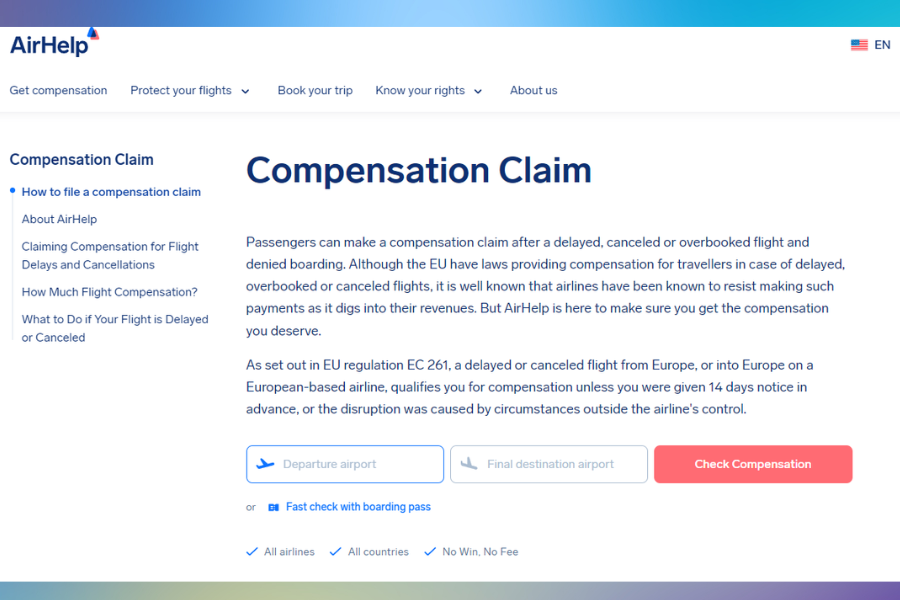
What should I do if AirHelp does not respond to my email
Check Your Email
- Make sure you sent the email to the correct address. AirHelp’s main email is [email protected]
- Check your sent folder to confirm the email was sent successfully.
- Check your spam/junk folder in case the response ended up there.
Follow Up
- If it’s been a few days since you sent the email, send a polite follow-up email asking if they received your original message and when you can expect a response.
- Include the original email in the follow-up so they can easily reference your previous message.
Contact Through Other Channels
- If email is not working, try reaching out through AirHelp’s live chat support which is available 24/7 for AirHelp Plus members.
- You can also try contacting them through their social media channels like Facebook or Twitter.
- As a last resort, you can call their customer service number if available for your region.
Check Your Claim Status
- Log into your AirHelp account and check the status of your claim.
- If the claim is still open, you can send a message through your account dashboard.
- If the claim is closed, you may need to submit a new claim if you have additional information.
File a Complaint
- If you still don’t get a response after following up through multiple channels, you can file a complaint with the relevant consumer protection agency in your country.
- In the EU, you can file a complaint with the European Consumer Centre.
What documents do I need to make a claim on AirHelp
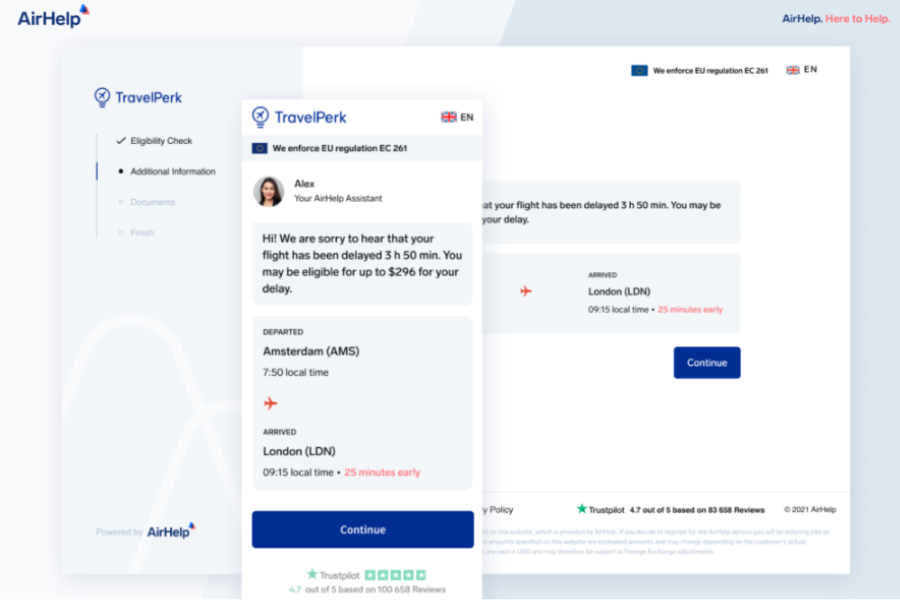
What documents do I need to make a claim on AirHelp
To successfully make a claim with AirHelp for flight compensation, you will need to gather and submit several key documents and pieces of information. Here’s a detailed list of what is typically required:
Required Documents for AirHelp Claims
1. Flight Information:
- Flight Number: The specific number associated with your flight.
- Airline Name: The name of the airline you traveled with.
- Date of Flight: The date when the flight took place.
- Departure and Arrival Locations: The airports or cities where your flight originated and where it was supposed to land.
2. Personal Identification:
- Booking Confirmation: This is often an email or a printed document confirming your flight details.
- Passenger ID Copies: A copy of your identification (such as a passport or driver’s license) may be required to verify your identity.
3. Supporting Documentation:
- Boarding Pass: A copy of your boarding pass can help substantiate your claim.
- Communication from the Airline: Any emails or messages regarding flight delays, cancellations, or overbooking that you received from the airline.
4. Authorization Documents:
- If you are filing on behalf of someone else (like a family member), you will need a Power of Attorney or similar authorization document that allows you to act on their behalf. This is especially important for minors, where additional documentation may be required.
5. Additional Details:
- Information about the nature of the disruption (e.g., delay, cancellation, denied boarding).
- The reason for the delay if known, as well as the duration of the delay.
Submission Process
Once you have gathered all necessary documents:
- Fill Out the Claim Form: You can do this through AirHelp’s website. Ensure that all information is accurate and matches your documents.
- Upload Supporting Documents: Submit all collected documents as part of your claim process.
- Sign Authorization Forms: If AirHelp is handling your claim, you will need to sign an assignment form that allows them to act on your behalf in negotiations with the airline.
- Follow Up: After submission, keep an eye on any communications from AirHelp regarding your claim status.
By ensuring that you have all these documents ready, you can streamline the process and improve your chances of a successful claim with AirHelp.
What additional benefits come with AirHelp+ Complete
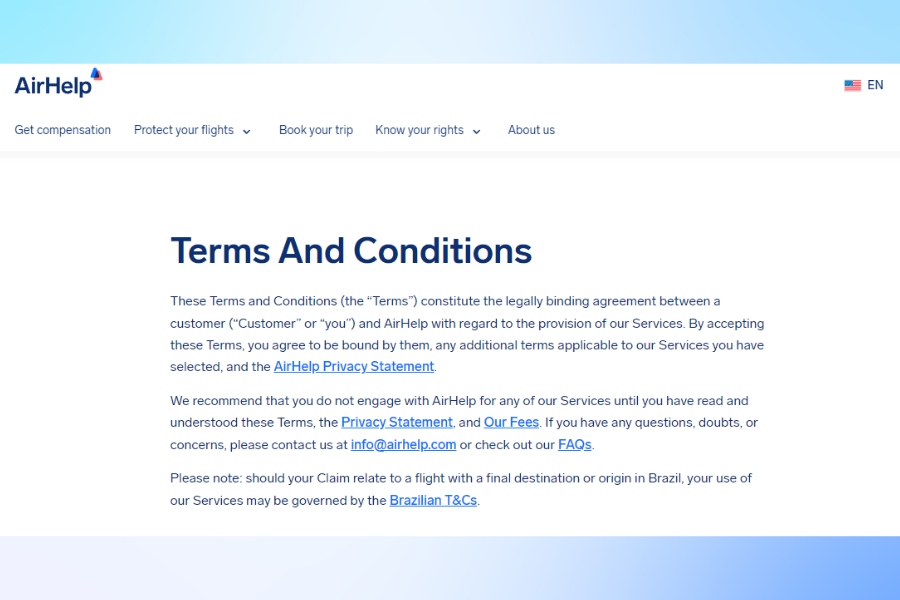
What additional benefits come with AirHelp+ Complete
The AirHelp+ Complete plan offers several additional benefits compared to the standard AirHelp service:
100% Compensation Payout
As an AirHelp+ Complete member, you receive 100% of the compensation amount from the airline if AirHelp successfully claims compensation for a delayed, canceled or overbooked flight. Without AirHelp+, you would only receive a maximum of 65% of the compensation amount, with AirHelp taking a 35-50% commission.
AirPayout Insurance
AirHelp+ Complete provides an automatic €100 payout to your account if your flight is delayed by more than 3 hours, canceled within 28 days of departure, or diverted. This is in addition to any compensation received from the airline.
AirLuggage Insurance
You’ll get €100 if your checked luggage is lost, delayed or damaged, independent of any claims against the airline.
Airport Lounge Access
If your flight is delayed by more than 1 hour or canceled less than 6 hours before departure, you’ll receive a lounge access voucher to use at over 1,100 lounges worldwide within 90 days. The lounge must be available at your departure airport.
Expense Reimbursement
AirHelp will check eligibility and help you claim back money lost due to the flight disruption, such as extra hotel nights or missed excursions. The minimum claim value is €200.So in summary, the AirHelp+ Complete plan provides additional insurance payouts, 100% compensation, lounge access, and expense reimbursement on top of AirHelp’s standard flight disruption compensation service. The annual membership fee is €64.99
How can I track the status of my claim on the AirHelp website
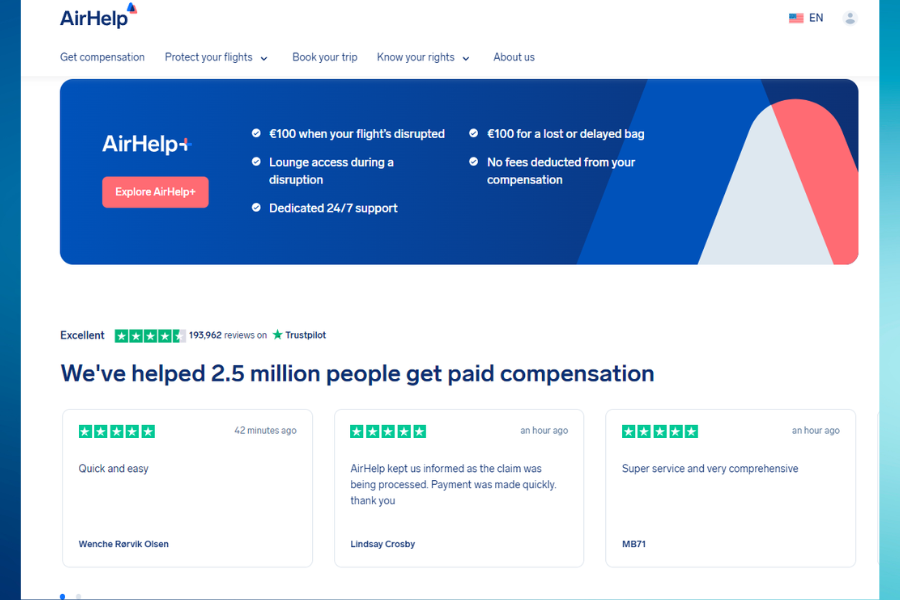
How can I track the status of my claim on the AirHelp website
- Go to the AirHelp Website: Open your web browser and navigate to www.airhelp.com.
- Log in to your AirHelp account on their website. You can find the login link in the top right corner.
- Once logged in, go to the “Claims & Flights” tab in your customer dashboard. This is where you can view the status of all your claims.
- Each claim will have a status indicator showing where it’s at in the process, such as “Claim Submitted”, “Claim Accepted”, “Claim Rejected”, etc.
- AirHelp will also send you email notifications with updates on your claim status throughout the process.
- If your claim is successful, you’ll be able to see the expected compensation amount in your dashboard as well.
Conclusion: Is Airhelp the right choice for delayed flight compensation?
AirHelp is a prominent service for airline compensation, particularly known for assisting passengers with claims related to flight delays, cancellations, and overbookings. Here’s a detailed overview of its strengths and weaknesses to help determine if it’s the right choice for you.
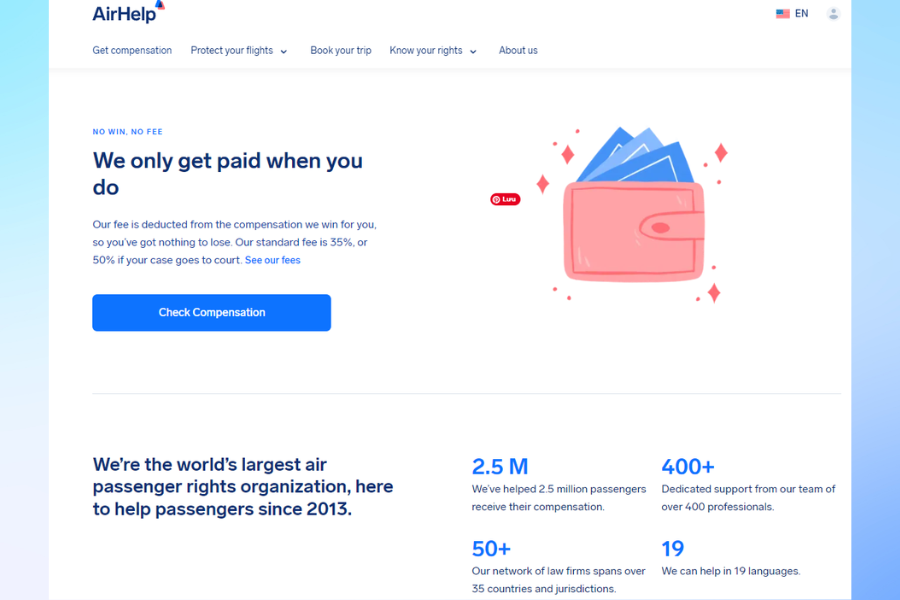
Conclusion Is Airhelp the right choice for airline compensation
Strengths of AirHelp
- Expertise in Passenger Rights: AirHelp specializes in air passenger rights, especially under regulations like EU Regulation 261/2004, which mandates compensation for significant flight disruptions. Their extensive knowledge helps streamline the claims process for passengers.
- No-Win, No-Fee Policy: This model means you only pay AirHelp if they successfully secure compensation on your behalf. This significantly reduces the financial risk associated with filing a claim independently.
- User-Friendly Platform: The service is designed to simplify the claim process, utilizing technology to automate much of the paperwork and analysis, which can be daunting for individuals.
- Dedicated Legal Team: With over 350 legal experts, AirHelp provides robust support for navigating complex claims, enhancing your chances of success.
- High Success Rate: AirHelp boasts a success rate of over 95% in identifying valid claims through its AI-driven eligibility checker, which can expedite the process significantly.
Weaknesses of AirHelp
- Commission Fees: AirHelp retains a commission of around 35% from any compensation awarded. This can be seen as high compared to handling claims independently, where no fees would apply.
- Processing Time: The claims process can take several months, depending on the airline’s response time and legal proceedings. Some users have reported lengthy wait times before receiving compensation.
- Limited Coverage Outside Europe: While AirHelp is effective for flights within or to/from Europe, its effectiveness diminishes in regions without strong passenger rights regulations, such as the U.S., where airlines are not legally required to compensate for delays.
Who Should Use AirHelp?
AirHelp is particularly beneficial for:
- Travelers Who Prefer Convenience: If you dislike dealing with bureaucracy or lack the time to navigate the claims process yourself, AirHelp can save you significant effort and stress.
- Passengers Unfamiliar with Their Rights: Many travelers are unaware of their rights regarding flight disruptions. AirHelp’s expertise can help ensure that you receive the compensation you deserve without needing extensive knowledge about aviation regulations.
- Individuals with High Flight Volumes: Frequent flyers who encounter delays or cancellations may find value in using AirHelp consistently, as the service can manage multiple claims efficiently.
In conclusion, whether AirHelp is the right choice depends on your personal circumstances and preferences. If you value convenience and professional assistance in navigating airline compensation claims and are willing to pay a commission for that service, AirHelp could be a suitable option. However, if you are comfortable handling claims independently and wish to avoid fees, pursuing compensation directly from airlines may be more advantageous.
CTA: Ready to claim your airline compensation hassle-free? Visit Airhelp.com today and let them handle the process for you!

